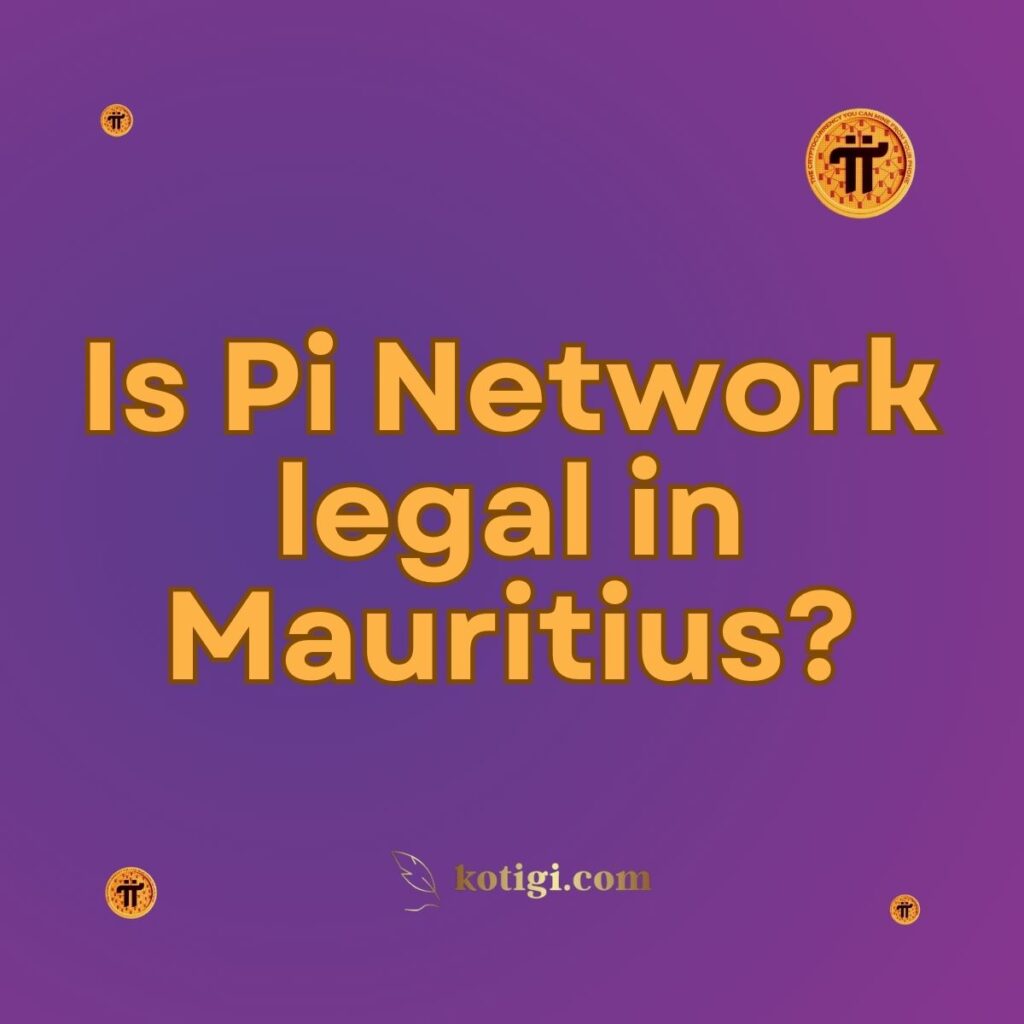
Is Pi Network legal in Mauritius?
Pi Network is currently legal in Mauritius. While Mauritius has developed frameworks for regulating financial technology (FinTech) and digital assets, the Pi Network operates in an unregulated space, meaning there are no specific laws or restrictions against its use. However, Mauritius has shown interest in creating a secure and transparent environment for digital assets, and users should stay informed about potential future regulations.
Introduction
Mauritius, a small island nation with a growing financial technology (FinTech) sector, has attracted attention for its progressive approach to blockchain and digital assets. As Pi Network continues to expand globally, many Mauritians are curious about its legal status. This mobile-based cryptocurrency mining platform allows users to earn Pi tokens without advanced computing equipment, making it accessible to a broad audience. But is participating in Pi Network legal in Mauritius? This article will explore the current legal status of Pi Network in Mauritius, its regulatory framework for cryptocurrencies, and the implications for Mauritian users.
1. Overview of Cryptocurrency Regulations in Mauritius
1.1 Mauritius’ Commitment to Financial Innovation
Mauritius has positioned itself as a key player in the development of financial innovation, particularly through the Mauritius International Financial Centre (IFC). The government’s approach is geared towards fostering a transparent and secure environment for financial services while embracing new technologies such as blockchain and cryptocurrencies. Through its regulatory bodies, Mauritius has been actively supporting FinTech innovations while implementing necessary safeguards to protect users.
1.2 Mauritius Financial Services Commission (FSC) and Cryptocurrency Regulations
The Financial Services Commission (FSC) of Mauritius is responsible for overseeing the regulation of financial products and services, including digital assets. In 2020, Mauritius became one of the first countries in the region to implement a regulatory framework for Security Token Offerings (STOs), a type of digital asset. However, this framework primarily applies to companies and institutions dealing with security tokens, and does not yet extend to platforms like Pi Network, which focuses on mobile cryptocurrency mining.
1.3 Digital Asset Regulations in Mauritius
While Pi Network does not currently fall under specific cryptocurrency regulations in Mauritius, the country’s open-minded stance towards digital assets suggests that future regulations could emerge as the platform grows in popularity. For now, users are free to mine Pi tokens without the need to adhere to formal cryptocurrency regulations. However, it is essential for users to stay updated on potential changes in the law, especially as the global regulatory landscape for cryptocurrencies evolves.
2. Legal Considerations for Pi Network Users in Mauritius
2.1 Current Legal Status of Pi Network
At present, Pi Network operates legally in Mauritius. The platform’s focus on mobile mining, rather than financial transactions or exchanges, keeps it outside the scope of existing cryptocurrency regulations. As long as Pi Network operates in its current phase, where users mine tokens without real-world monetary value, there are no legal concerns for Mauritian users. However, when Pi Network transitions to a decentralized blockchain and Pi tokens become tradable, this could trigger additional regulatory scrutiny.
2.2 Potential for Future Regulations
Given Mauritius’ proactive stance on regulating digital assets, it is possible that the government could introduce new regulations that affect platforms like Pi Network. The regulatory landscape for cryptocurrencies is rapidly evolving worldwide, and Mauritius is no exception. Mauritian authorities may eventually decide to establish guidelines for mobile-based cryptocurrencies or decentralized platforms. In such a case, Pi Network users in Mauritius should be prepared to comply with any new rules, including potential Know Your Customer (KYC) requirements.
2.3 Compliance with Anti-Money Laundering (AML) Regulations
Mauritius takes anti-money laundering (AML) regulations seriously, and the country has been working to ensure its financial systems comply with international standards. Although Pi Network currently operates in a non-monetary phase, Mauritian users should remain cautious. Once Pi tokens gain value and can be traded or exchanged, AML regulations may come into play. It’s important for users to be aware of potential compliance requirements in the future to avoid any legal issues.
3. Risks and Challenges for Pi Network Users in Mauritius
3.1 Regulatory Uncertainty
One of the primary challenges for Pi Network users in Mauritius is regulatory uncertainty. While the platform is legal now, evolving regulations could create new compliance obligations in the future. Mauritian authorities are likely to monitor the growth of Pi Network and similar platforms, particularly as mobile mining becomes more popular. Users should stay informed and be aware that legal changes may affect their participation.
3.2 Potential Tax Implications
At present, Pi tokens do not hold any real-world value, meaning there are no immediate tax implications for Mauritian users. However, as Pi tokens become tradable on exchanges and gain value, users may be subject to taxation. The Mauritius Revenue Authority (MRA) could classify gains from Pi tokens as income or capital gains, depending on how the tokens are used. Users should keep detailed records of their Pi Network activities to prepare for any potential tax obligations in the future.
3.3 Data Privacy Concerns
Data privacy is a significant issue for users of any digital platform, including Pi Network. Mauritius has adopted the Data Protection Act (DPA) in line with the EU’s General Data Protection Regulation (GDPR), offering strong protections for personal data. Mauritian users should be mindful of the personal information they share within the Pi Network app and ensure that the platform complies with these data protection standards. As Pi Network grows, it may introduce additional security and privacy features to safeguard user data.
4. Opportunities for Pi Network Users in Mauritius
4.1 Early Adoption of a Promising Cryptocurrency
One of the key opportunities for Mauritian users is the chance to participate in Pi Network during its early stages. If Pi becomes a widely accepted and valuable cryptocurrency, early adopters may stand to benefit significantly. By mining Pi tokens now, Mauritian users could accumulate a valuable asset with the potential for future growth.
4.2 FinTech Development and Blockchain Integration
Mauritius has made a name for itself as a regional leader in FinTech and blockchain technology. With Pi Network’s focus on decentralization and mobile mining, there may be opportunities for Mauritian developers to integrate Pi’s blockchain technology into local projects. As Pi Network’s ecosystem grows, it could become a valuable tool for the Mauritian FinTech sector, driving innovation and offering new solutions for businesses and consumers alike.
4.3 Collaboration with Global Crypto Communities
Pi Network’s decentralized nature allows users to collaborate with a global community of cryptocurrency enthusiasts. Mauritian users can leverage this opportunity to connect with like-minded individuals around the world, exchange ideas, and contribute to the growth of the network. This global collaboration aligns with Mauritius’ ambition to be a hub for digital innovation and technological development.
5. The Future of Pi Network in Mauritius
5.1 Potential for Token Trading and Real-World Use
As Pi Network transitions to a fully decentralized blockchain and its tokens become tradeable, Mauritian users could see more real-world use cases for Pi. Whether it’s as a medium of exchange, a tool for remittances, or a payment method for local businesses, Pi tokens could play a role in Mauritius’ digital economy. However, users should be mindful of any regulatory changes that accompany this transition, particularly in terms of AML compliance and taxation.
5.2 Increased Regulatory Oversight
As Pi Network gains traction, Mauritian regulators may take a closer look at how the platform operates. This could lead to increased oversight, particularly if Pi tokens gain significant value or are used for financial transactions. The Financial Services Commission (FSC) may introduce new guidelines or regulations that impact mobile-based cryptocurrencies, and Pi Network users will need to comply with these rules to continue participating legally.
5.3 Integration with the FinTech Ecosystem
Mauritius has made significant strides in establishing itself as a FinTech hub, and Pi Network could eventually integrate into the local ecosystem. Mauritian developers and businesses could find ways to incorporate Pi’s blockchain technology into their projects, creating new opportunities for innovation. As Pi Network evolves, its technology could complement existing FinTech solutions in Mauritius, contributing to the country’s digital transformation.
Conclusion
Pi Network is currently legal in Mauritius, offering users a unique opportunity to mine a mobile-based cryptocurrency without facing regulatory hurdles. As the country continues to develop its FinTech and digital asset sectors, users should stay informed about potential regulatory changes that could impact Pi Network’s operations in the future. By participating in Pi Network now, Mauritian users can position themselves as early adopters of a promising cryptocurrency, with the potential for significant rewards as the platform evolves.
Key Takeaways
- Pi Network is legal in Mauritius, and users can participate in mobile mining without violating any laws.
- Mauritius has a forward-thinking approach to FinTech and digital assets, but users should remain aware of potential future regulations that could impact Pi Network.
- Data privacy is important, and users should ensure that Pi Network complies with the country’s Data Protection Act to safeguard personal information.
- Taxation may apply in the future, especially if Pi tokens gain value and become tradeable. Users should keep records of their mining activities.
- Early adoption could offer significant benefits, as Mauritian users mine Pi tokens before they gain real-world utility and value.





